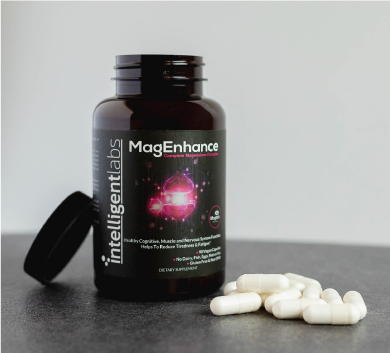If you’re taking calcium supplements, do read this article until the very end. New research shows they don’t work and may even be dangerous! Find out why this is so and what to do about it instead. Also, we’ll talk about the link between calcium and magnesium. And why our MagEnhance Triple Magnesium Complex is a safe alternative to calcium supplements.
Table of Contents
Why do people take calcium supplements anyway?
Around 30-40 years ago, doctors began to tell their elderly patients to take calcium supplements on a regular basis. The idea was to combat the effects of bone loss due to aging. At the time, it was probably the most logical thing to do. After all, the mineral content of bones is 64% calcium, with almost all of it found in our teeth and bones.
But what do the recent studies on calcium supplements say?
40 years later, the latest research shows that they aren’t as beneficial as initially thought. Here’s why:
They do not slow or stop bone loss
Increasing calcium intake, either through diet or supplements, does not slow or stop bone loss. Neither does it prevent falls or fractures in older men and women (1, 2).
They can lead to health issues
Taking too much calcium can actually cause health problems, such as kidney stones (3) and heart disease. It can also increase the risk of heart attacks and stroke.
They can increase the risk of heart attack and heart disease
A large-scale study that followed almost 24,000 men and women aged 35-64 for 11 years reported interesting results. The found that people who took calcium supplements had a greater risk of heart attack. Meanwhile, those who got calcium from their diet had a considerably lower risk (4).
Another study done on over 12,000 people supported the findings above. They reported that those who took calcium supplements had an increased risk of heart attack, stroke, and death (5).
Furthermore, another study found that taking over 1000 mg/day of calcium supplements led to an increase in the risk of death from heart disease (6).

Does it mean we need to avoid calcium now?
No, absolutely not. What the latest studies are saying is certainly an eye-opener. However, there’s no need to be afraid.
Dietary calcium is NOT the same as calcium supplements.
The research is not saying that dietary calcium is not beneficial (our bodies need calcium, after all). It’s saying that eating dietary calcium + taking calcium supplements can potentially cause health problems.
The additional / excess calcium from supplements can cause a sudden burst of calcium in the blood. This can get embedded in our arteries leading to plaque formation. Over time, these plaques can enlarge and clog the arteries, which then restricts the blood flow, either partially or completely.
The good news is that dietary calcium is absorbed differently, slowly, and in smaller quantities. So it does not have the same effect as calcium supplements (7).
The calcium and magnesium link

Increasing our calcium intake via supplements can upset the natural balance between calcium (Ca) and magnesium (Mg).
Like calcium, magnesium has many functions in our body, including maintaining the balance between calcitonin and the parathyroid hormone. So, what do these 2 hormones do?
- Calcitonin – decreases the calcium levels in the blood by preventing bone breakdown
- Parathyroid hormone – increases calcium levels in the blood by increasing bone resorption and preventing calcium from being deposited into bones
In short, too much Ca inhibits Mg absorption.
Not enough Mg means less calcitonin and more parathyroid hormone. This imbalance causes our bones to lose their density and hardness.
Why we’re not getting enough magnesium…
Even without excess calcium intake to inhibit magnesium, the majority of us do not get enough on a daily basis. In fact, on average, we are only getting 68% of the recommended daily value of magnesium (8). Here are a few reasons why most of us are not getting enough of this nutrient:
Mg has been taken out of our food
In order to obtain more quantities and varieties of fruit and vegetables, the crops are growing quicker but spending less time in the ground to absorb the necessary nutrients. Thus, even the “good stuff” we buy from supermarkets has significantly less nutrients than 30-40 years ago (9). It’s even been taken out of our salt and filtered out of our water.
Stress of modern life
The sustained stress of our daily lives leeches our body of magnesium and reduces our gut’s ability to absorb it.
Lack of understanding regarding magnesium’s benefits
Combined with the reduced availability of magnesium, most doctors also do not understand its importance in bone health. In fact, many doctors still believe that people should consume at least twice as much calcium as magnesium. However, this belief is based on false information.

Back in 1989, the French researcher Dr Jean Durlach suggested the 2:1 calcium-to-magnesium ratio as an extreme that should never be exceeded. However, this was misunderstood, and it has now become thought of as the ‘norm’ (10).
In reality, we should be aiming for a ratio of 1:1. However, the average diet today has much more calcium than magnesium. If you consume additional calcium supplements, it will increase the ratio to 4:1 or 5:1!
We know from the previously mentioned studies that this isn’t beneficial to our health.
Fortunately, there is an easy solution to this, and that is to swap calcium supplements for magnesium supplements.
Magnesium and higher bone density
One of the leading risk factors for developing osteoporosis is Mg deficiency (8). Several studies on both men and women show that those with higher Mg intake have a higher bone density (11). Also, another study has found that postmenopausal women with osteoporosis have lower blood Mg levels than healthy postmenopausal women (12).
Additionally, increasing Mg intake can increase bone mineral density in postmenopausal women (13). In fact, just taking 1830 mg of Mg citrate for 30 days may help postmenopausal women with osteoporosis to have less bone loss (14).
Instead of calcium supplements, take high-absorption magnesium

It is essential to recognize that many researchers use Mg citrate or oxide in their studies. Unfortunately, these aren’t the highest quality nor the most easily absorbed magnesium available.
That said, the potential benefits on bone density are much greater using maximum absorption magnesium!
Case in point, our Magenhance Magnesium Complex. MagEnhance contains 3 forms of bioavailable magnesium – Mg L-Threonate, Mg Taurate, and Mg Glycinate.
Magnesium is great for the heart and immune system. It improves sleep, helps you feel calm, relieves aches and pains, and even promotes insulin sensitivity.
To sum up this post, there is no downside to trying a magnesium supplement for yourself. And unlike calcium, magnesium is a much safer supplement to take!
💬 Something on your mind? Share your thoughts in the comments. We love hearing from curious minds.
📩 And while you’re here, join our newsletter for more smart stuff (and secret perks)!
References:
(1) Calcium intake and bone mineral density: systematic review and meta-analysis, Vicky Tai, William Leung, Andrew Grey, Ian R Reid, Mark J Bolland, BMJ . 2015 Sep 29;351:h4183.
(2) Calcium intake and risk of fracture: systematic review, Mark J Bolland, William Leung, Vicky Tai, Sonja Bastin, Greg D Gamble, Andrew Grey, Ian R Reid, BMJ . 2015 Sep 29;351:h4580.
(3) Calcium plus vitamin D supplementation and the risk of fractures, Rebecca D Jackson, Andrea Z LaCroix, Margery Gass, Robert B Wallace, John Robbins, Cora E Lewis… N Engl J Med . 2006 Feb 16;354(7):669-83.
(4) Associations of dietary calcium intake and calcium supplementation with myocardial infarction and stroke risk and overall cardiovascular mortality in the Heidelberg cohort of the European Prospective Investigation into Cancer and Nutrition study (EPIC-Heidelberg,) Kuanrong Li, Rudolf Kaaks, Jakob Linseisen, Sabine Rohrmann, Heart . 2012 Jun;98(12):920-5.
(5) Effect of calcium supplements on risk of myocardial infarction and cardiovascular events: meta-analysis , Mark J Bolland, Alison Avenell, John A Baron, Andrew Grey, Graeme S MacLennan, Greg D Gamble, Ian R Reid, BMJ . 2010 Jul 29;341:c3691.
(6) Dietary and supplemental calcium intake and cardiovascular disease mortality: the National Institutes of Health-AARP diet and health study, Qian Xiao, Rachel A Murphy, Denise K Houston, Tamara B Harris, Wong-Ho Chow, Yikyung Park, JAMA Intern Med . 2013 Apr 22;173(8):639-46.
(7) Calcium supplements: bad for the heart? Ian R Reid, Mark J Bolland, Volume 98, Issue 12.
(8) Skeletal and hormonal effects of magnesium deficiency, Robert K Rude, Frederick R Singer, Helen E Gruber, J Am Coll Nutr . 2009 Apr;28(2):131-41
(9) Declining Fruit and Vegetable Nutrient Composition: What Is the Evidence? Donald R. Davis, Article Category: Research Article Online Publication Date: Feb 2009 Page(s): 15–19 Volume/Issue: Volume 44: Issue 1.
(10) Recommended dietary amounts of magnesium: Mg RDA J Durlach, Magnes Res . 1989 Sep;2(3):195-203.
(11) Osteoporosis prevention and nutrition, Katherine L Tucker, Curr Osteoporos Rep . 2009 Dec;7(4):111-7.
(12) Magnesium, zinc and copper status in osteoporotic, osteopenic and normal post-menopausal women, M Mutlu, M Argun, E Kilic, R Saraymen, S Yazar, J Int Med Res . 2007 Sep-Oct;35(5):692-5.
(13) Dietary Reference Intakes for Calcium, Phosphorus, Magnesium, Vitamin D, and Fluoride Institute of Medicine (US) Standing Committee on the Scientific Evaluation of Dietary Reference Intakes, Washington (DC): National Academies Press (US); 1997.
(14) Short-term oral magnesium supplementation suppresses bone turnover in postmenopausal osteoporotic women, Hasan Aydin, Oğuzhan Deyneli, Dilek Yavuz, Hülya Gözü, Nilgün Mutlu, Işik Kaygusuz, Sema Akalin, Biol Trace Elem Res . 2010 Feb;133(2):136-43.





